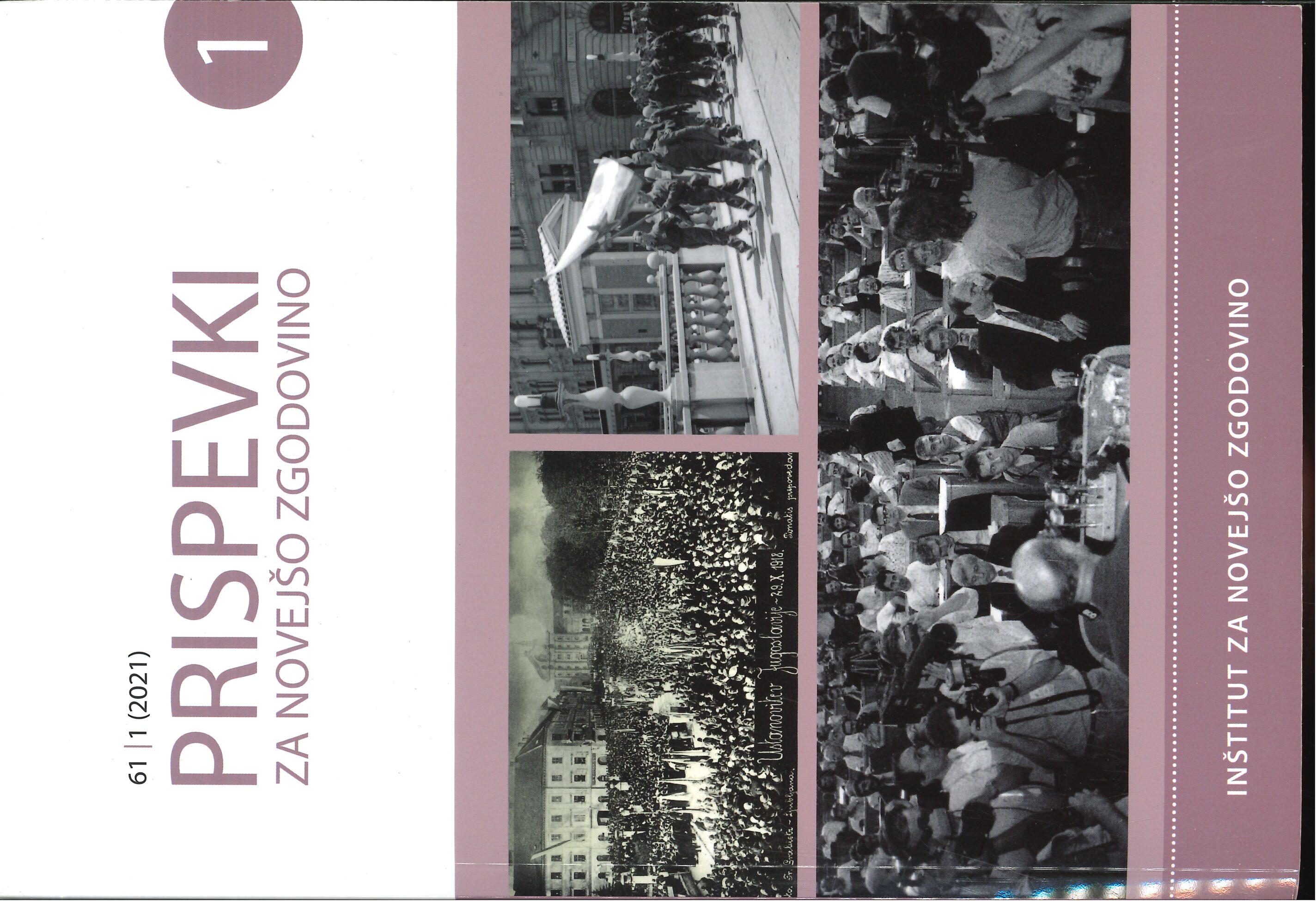Trikrat: sosledje v zgodovinskem dogajanju na poti do slovenske državnosti v 20. stoletju
DOI:
https://doi.org/10.51663/pnz.61.1.01Ključne besede:
Slovenija, država, politika, samoodločba, jugoslovanstvo, slovenstvoPovzetek
Slovenska država je nastala v »kratkem 20. stoletju«. Slovenci smo do države, ki jo imamo sedaj, prišli postopoma. V treh korakih: 1918, 1941–45, 1990–91. Pri tem je šlo pri nastajanju slovenske državnosti za povezanost, za sosledje. Brez dosežene prve slovenske državnosti ne bi bilo druge, zlasti pa brez druge ne bi bilo tretje. Vsak korak oblikovanja državnosti se je zgodil v svojem obdobju, v različnih pogojih, ki so vplivali na potek nastajanja države in stopnjo njene samostojnosti. Do prvega je prišlo ob koncu prve svetovne vojne, ko so bile zaradi mednarodnih političnih pogojev pretrgane državnopravne vezi z avstro-ogrsko državo in smo Slovenci vstopili v Državo Slovencev, Hrvatov in Srbov, ta pa se je nato s Kraljevino Srbijo »zedinila« v Kraljevino Srbov, Hrvatov in Slovencev (od leta 1929 Kraljevino Jugoslavijo), drugi se je zgodil v času druge svetovne vojne, ko je jugoslovanska država doživela kolaps in jo je bilo treba obnoviti, in to v novih pogojih, z novo organizacijo, za kar so se v vojnem obdobju zavzemali v t. i. meščanskem političnem taboru, v tradicionalnih slovenskih političnih strankah in tudi v t. i. revolucionarnem taboru oziroma v osvobodilnem gibanju, tretji pa takrat, ko se je jugoslovanska država, ki je bila organizirana po merilih v vojni zmagovitega osvobodilnega gibanja, izpela. Vsem trem korakom je bil skupen namen, medtem ko sta bila način do državnosti in odnos do nje različna. Način državnosti in odnos do nje sta bila odvisna od razmer pa tudi razmerij med dejavniki oziroma ustvarjalci državnosti in od političnih ali družbenih nosilcev. Oblikovanje slovenske državnosti v »kratkem 20. stoletju« je povezano s samoodločbo. Bila je sredstvo ali osnova, na kateri je bila državnost na vsaki posamezni stopnji zgrajena. V vsakem od korakov oblikovanja državnosti je bila nekoliko drugače razumljena. Samoodločba je bila bistven pogoj in sredstvo, da smo Slovenci do države sploh prišli. V vseh treh korakih njenega ustvarjanja.
Literatura
Balkanski Babilon: raspad Jugoslavije od Titove smrti do Miloševićeva pada. Zagreb: Alinea, 2005.
Balkovec, Bojan. Prva slovenska vlada 1918–1921. Ljubljana: Znanstveno in publicistično središče, 1992.
Čepič, Zdenko, Damijan Guštin in Nevenka Troha. Slovenija v vojni 1941–1945. Ljubljana: Modrijan, 2017.
Ćosić, Dobrica. Piščevi zapisi: (1951–1968). Beograd: Filip Višnjić, 2001.
Ćosić, Dobrica. Piščevi zapisi: (1969–1980). Beograd: Filip Višnjić, 2001.
Hobsbawm, Eric. Čas skrajnosti: svetovna zgodovina 1914–1991. Ljubljana: Znanstveno in publicistično središče, 2000.
Kristan, Ivan. »Pravica do samoodločbe.« V : Zbornik znanstvenih razprav. Ljubljana: Pravna fakulteta, 1990.
Perovšek, Jurij. Samoodločba in federacija: slovenski komunisti in nacionalno vprapanje 1920–1941. Ljubljana: Inštitut za novejšo zgodovino, 2012.
Perovšek, Jurij. Slovenska osamosvojitev v letu 1918: študija o slovenski državnosti v državi Slovencev, Hrvatov in Srbov. Ljubljana: Modrijan, 1998.
Perovšek, Jurij. Slovenski prevrat 1918: položaj Slovencev v Državi Slovencev, Hrvatov in Srbov. Ljubljana: Inštitut za novejšo zgodovino, 2018.
Perovšek, Jurij. »Slovenski komunisti in vprašanje makedonskega naroda leta 1923.« Prispevki za zgodovino delavskega gibanja 18/19, št. 1-2 (1978/1979): 17–44.
Pleterski, Janko. Knjiga pisem: razmišljanje o slovenski državnosti. Ljubljana: Sophia, 2017.
Pleterski, Janko. Narodi, Jugoslavija, revolucija. Ljubljana: Komunist, 1986.
Pleterski, Janko. Pravica in moč za samoodločbo: med Metternichom in Badinterjem: študije, razgledi, preudarki iz petnajstletja po tretji odločitvi Slovencev. Ljubljana: Modrijan, 2008.
Pleterski, Janko. Prva odločitev Slovencev za Jugoslavijo: politika na domačih tleh med vojno 1941–1918. Ljubljana, Slovenska matica, 1971.
Rahten, Andrej. Zavezništvo in delitve: razvoj slovensko-hrvaških političnih odnosov v habsburški monarhiji 1848–1918. Ljubljana, Nova revija, 2005.
Ramet, Sabrina P. Balkan Babel: politics, culture, and religion in Yugoslavia. Oxford: Westview Press, 1992.
Ramet, Sabrina P. Nationalism and Federalism in Yugoslavia, 1962–1991. Indianapolis: Indiana University Press, 1992.
Ramet, Sabrina P. Tri Jugoslavije: izgradnja države i izazov legitimacije, 1918.–2005. Zagreb: Golden marketing-Tehnička knjiga, 2009.
Repe, Božo. Jutri je nov dan: Slovenci in razpad Jugoslavije. Ljubljana: Modrijan, 2002.
Slovenci in država: zbornik prispevkov z znanstvenega posveta na SAZU (od 9. do 11. novembra 1994). Ljubljana: Slovenska akademija znanosti in umetnosti, 1995.
Slovenska novejša zgodovina: od programa Zedinjena Slovenija do mednarodnega priznanja Republike Slovenije: 1848–1992. Ljubljana: Mladinska knjiga in Inštitut za novejšo zgodovino, 2006.
Stiplovšek, Miroslav. Banski svet Dravske banovine: 1930–1935: prizadevanja banskega sveta za omilitev gospodarsko-socialne krize in razvoj prosvetno-kulturnih dejavnosti v Sloveniji ter za razširitev samoupravnih in upravnih pristojnosti banovine. Ljubljana: Znanstveno raziskovalni inštitut Filozofske fakultete, 2006.
Stiplovšek, Miroslav. »Prizadevanja ljubljanske in mariborske oblastne skupščine ter banskega sveta Dravske banovine za udejanjenje slovenskega parlamentarizma v prvi Jugoslaviji.« Zgodovinski časopis 62, št. 1-2 (2008): 151–76.
Miroslav Stiplovšek. Slovenski parlamentarizem 1927–1929. Ljubljana: Znanstveni inštitut Filozofske fakultete, 2000.
Taylor, Alan John Percival. Habsburška monarhija 1809–1918: zgodovina avstrijskega cesarstva in Avstro-Ogrske. Ljubljana: Državna založba, 1956.
Prenosi
Objavljeno
Številka
Rubrika
Licenca
Avtorji prispevkov, objavljenih v tej reviji, soglašajo z naslednjimi pogoji glede avtorskih pravic:
- Avtorji ohranijo avtorske pravice, reviji pa odobrijo pravico do prve objave. Delo se hkrati zaščiti z licenco za prosto uporabo avtorskih del (Creative Commons Attribution License), ki drugim osebam omogoča deljenje dela ob priznanju avtorstva in prve objave v tej reviji.
- Avtorji lahko sklenejo ločene dodatne pogodbene dogovore za neizključno distribucijo različice dela, objavljene v reviji, (npr. oddaja v institucionalni repozitorij ali objava v knjigi) z navedbo, da je bilo delo prvič objavljeno v tej reviji.
- Pred postopkom pošiljanja in med njim lahko avtorji delo objavijo v spletu (npr. v institucionalnih repozitorijih ali na svoji spletnih strani), k čemer jih tudi spodbujamo, saj lahko to prispeva k plodnim izmenjavam ter hitrejšemu in obsežnejšemu navajanju objavljenega dela (glej The Effect of Open Access).


